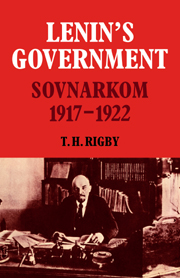Book contents
- Frontmatter
- Contents
- Tables
- Preface
- Acknowledgements
- Abbreviations
- Part One SMOLNY: SOVNARKOM TAKES SHAPE
- Part Two THE KREMLIN: SOVNARKOM IN ACTION
- Part Three OF MEN AND INSTITUTIONS
- 9 The system and the chief
- 10 The people's commissars: recruitment
- 11 The people's commissars: personal background
- 12 Government, soviets and party
- 13 Props for an ailing chairman
- 14 The last months
- 15 Some historical reflections
- Appendix A
- Appendix B
- Notes
- Bibliography
- Index
- Plate section
13 - Props for an ailing chairman
Published online by Cambridge University Press: 05 November 2011
- Frontmatter
- Contents
- Tables
- Preface
- Acknowledgements
- Abbreviations
- Part One SMOLNY: SOVNARKOM TAKES SHAPE
- Part Two THE KREMLIN: SOVNARKOM IN ACTION
- Part Three OF MEN AND INSTITUTIONS
- 9 The system and the chief
- 10 The people's commissars: recruitment
- 11 The people's commissars: personal background
- 12 Government, soviets and party
- 13 Props for an ailing chairman
- 14 The last months
- 15 Some historical reflections
- Appendix A
- Appendix B
- Notes
- Bibliography
- Index
- Plate section
Summary
Although Lenin formally retained the post of Chairman of Sovnarkom until his death in January 1924, his active role had begun contracting a full two and half years before that. Towards the middle of 1921 his attacks of severe headache and insomnia became more frequent and intense. At first he resisted the urgings of his colleagues to rest, even ignoring an Orgburo decision of 4 June obliging him to take leave – for Lenin an extraordinary flouting of Party discipline. On 8 July, however, he gave way and himself applied for a month's leave, with provision for two to three visits to his office per week, each of two to three hours' duration, in order to attend sittings of the Politburo, Sovnarkom and STO. This was accepted by the Politburo the next day, but with the stipulation that he was to attend Politburo meetings only, not those of Sovnarkom. Lenin duly commenced his leave on 13 July, though he only partly observed the prescribed conditions. Already on the 15th, coming to his office to attend a meeting of the Politburo, he also chaired meetings of Sovnarkom and STO. Apart from transacting a good deal of other government business during this period, he chaired further meetings of STO on 19 July and 3 August. On 9 August, on the advice of his doctors, the Politburo took a further decision obliging him to extend his leave under more rigorous conditions, which Lenin accepted: he was not to attend any meeting without the specific prior approval of the Central Committee Secretariat.
- Type
- Chapter
- Information
- Lenin's GovernmentSovnarkom 1917-1922, pp. 190 - 206Publisher: Cambridge University PressPrint publication year: 1979



